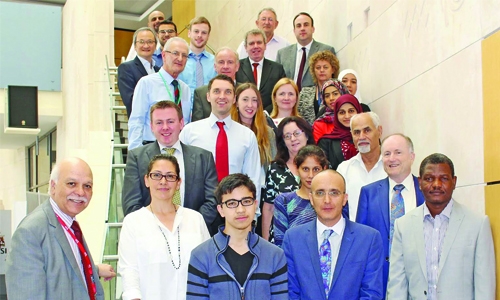RCSI Bahrain hosts regenerative medicine symposium
The Royal College of Surgeons in Ireland – Medical University of Bahrain (RCSI Bahrain) welcomed researchers from Bahrain, Saudi Arabia, U.A.E, UK and Ireland for a special symposium on regenerative medicine for tissue healing.
Organised by RCSI Bahrain Lecturer in Human Biology and Research Laboratory Manager and international representative of RCSI’s Tissue Engineering Regenerative medicine Group (TERG), Dr Michael Keogh, the event included scientific presentations covering biomaterials, nanotechnology and stem cell research for applications into diabetes, cardiovascular disease, cancer and wound healing.
The symposium kicked off with the first keynote address by Khalifa University Department of Biomedical Engineering Professor and Chair, Professor Tim McGloughlin on ‘The role of animal derived extracellular matrix materials in tissue engineering’.
RCSI Bahrain medical student James Cowman presented his research on understanding the macrophage immune response to substrate stiffness – carried out in conjunction with TERG at RCSI in Dublin last summer – before King Abdullah International Medical Research Centre (KAIMRC) Associate Research Scientist, Dr Ibraheem Bushnak gave an overview of the Nanomedicine group at KAIMRC and outlines areas of potential research collaboration with RCSI Bahrain.
University of Dammam Assistant Professor of Radiological Science, Dr Ali Alghamdi continued on the theme of nanotechnology with his paper on ‘Simulation of Gold nanoparticles versus boron nanoparticles for radiotherapy dose enhancement’ and Arabian Gulf University’s (AGU) College of Medicine and Medical Sciences Vice Dean for Graduate Studies and Research, Professor Randah Hamadeh gave insight into the Burden of Breast Cancer in Bahrain.
The second session began with Newcastle University Biomedical Research Centre Fellow and RCSI alumnus, Dr Grainne Gorman speaking on ‘Primary Mitochondrial disorders: diagnosis, treatment and future prospects’, before RCSI Bahrain Human Biology Lecturer, Dr Ebrahim Rajab presented research on the neuroprotective effects of Gum Arabic in aging brain of diabetic rats, a recent project jointly-funded by RCSI Bahrain and AGU.
RCSI Bahrain Head of School of Nursing and Midwifery, Professor Seamus Cowman gave a brief synopsis of his own research work, “Bedside to Bench: The Forgotten Paradigm’, while colleague, Research Associate, Paula Fox presented work examining novel skin graft substitutes for diabetic wound healing in the Middle East and RCSI Bahrain Medical Physics Lecturer, Andy Ma, closed out the middle session with his study on 3D modelling gold nanoparticle loaded stem cells for anticancer treatment.
Session three consisted of two keynote presentations by TERG investigators from Ireland; firstly in the shape of RCSI Anatomy Lecturer and Diabetes Reversing Implants with enhanced Viability and long-term Efficacy (DRIVE) coordinator, Dr Garry Duffy, who presented on the issue of ‘Diabetes Reversing Cell Implants’.
Finally, RCSI Professor of Bioengineering and Regenerative Medicine, Deputy Director of Research and Head of TERG, Professor Fergal O’Brien concluded proceedings with his presentation on ‘Advanced biomaterial based strategies for promoting vascularisation in regenerative medicine’.
During the presentation, Professor O’Brien noted the clear development and commitment by RCSI Bahrain towards regenerative-based research and highlighted the importance of this highly successful symposium, which showcased the university as an active hub in Regenerative Medicine.
It is hoped that this will become an annual forum in order to build international research between Europe and the Middle East, in line with RCSI Bahrain’s Strategic Pillar of research.
RCSI Bahrain is a constituent university of RSCI, which was established in 1784. Like its Irish counterpart, RCSI Bahrain is a not-for-profit health sciences institution focused on education and research to drive positive change in all areas of human health worldwide.
Related Posts

